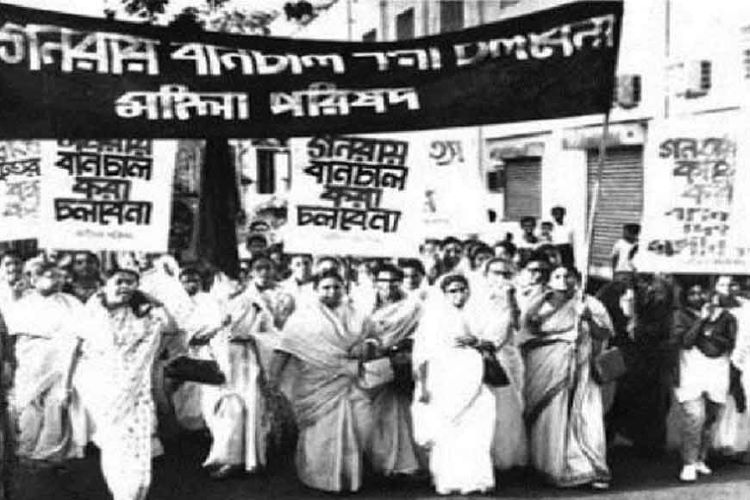
Women were at the forefront of the language marches, defying the pointed guns of the army and police
Farhana Naznin
The Language movement is one of the most significant incidents in Bangladesh’s history because the movement was the first step towards getting an independent Bangladesh. The movement basically began establish Bangla, the mother tongue of the majority in Bangladesh (then East Pakistan) as a state language. It was a struggle to protect cultural identity from government suppression. It laid the foundation of nationalism and paved the way for the birth of Bangladesh eventually.
While the name of Salam, Rafique, Barkat, Jobbar is attached to language movement because of their sacrifice for the Bangla language, there are number of women activists who also sacrificed.
Women actively participated in the movement-at a time when society was largely conservative. Conventional historical narratives have overshadowed the heroic deeds of women.
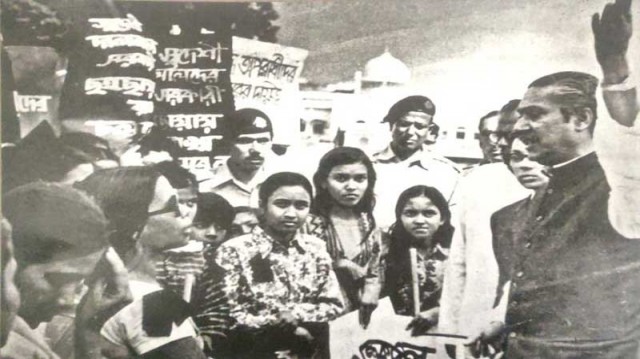 Later, women came forward to fill up the void in leadership when male leaders were imprisoned or had to go into hiding to avoid police arrest. Women were the first to defy curfew under section 144 on the fateful February 21, 1952.
Later, women came forward to fill up the void in leadership when male leaders were imprisoned or had to go into hiding to avoid police arrest. Women were the first to defy curfew under section 144 on the fateful February 21, 1952.
In this write-up we’ll tell the tale of some of the women, who had immense contribution and sacrifice for this language movement, along with others.
Pratibha Mutsuddi –Student of Chittagong College (1951) and Dhaka University (1954), member of Students’ Federation, participated in demonstrations held in Chittagong city protesting the firing on students in Dhaka in 1952. They were arrested for breaking Section 144 during 21 February, 1955.
Mamtaj Begum –Headmistress of Narayanganj Morgan Girl’s School. Arrested for organizing demonstration protesting police killings of language activists, she refused the government’s offer to sign a mercy petition admitting mistake in exchange for her freedom. She was jailed for over a year, she lost her job and was disowned by family. She Died all alone at the young age of 37.
Rawshan Ara Bachchu –Member of Democratic Progressive Student Front, spoke in favor of women’s participation in politics in a radio program in April, 1950. She was one of the forerunners to deny the curfew in DU Campus on 21 February, 1952. She was also involved in the students’ movement for a pro-people education policy.
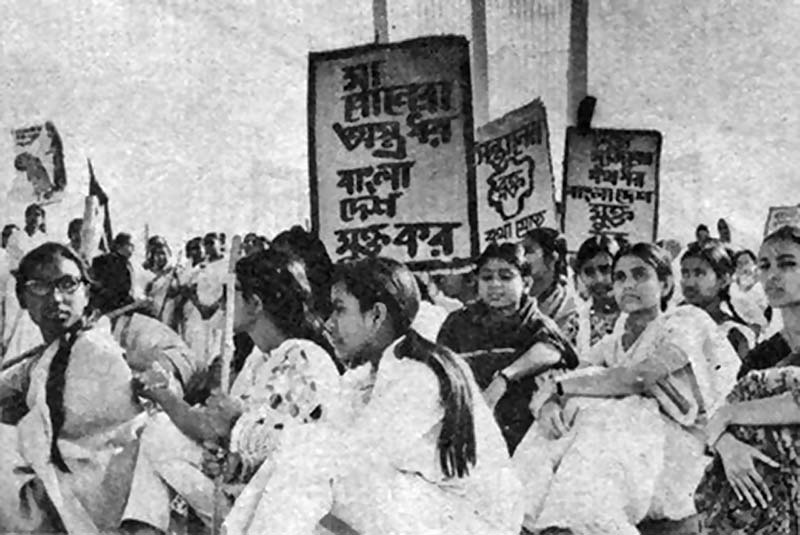 Anwara Khatun — one of the members along with Maulana Tarkabagish who famously staged walkout as a protest against Chief Minister Nurul Amin’s inaction during February 21 police firing. She moved a resolution in the East Bengal Legislative Assembly on February 22, 1952 demanding the unconditional release of all arrested for language protest and compensation to the victims. She led Awami League during 1966 when male leadership was imprisoned for the 6-points.
Anwara Khatun — one of the members along with Maulana Tarkabagish who famously staged walkout as a protest against Chief Minister Nurul Amin’s inaction during February 21 police firing. She moved a resolution in the East Bengal Legislative Assembly on February 22, 1952 demanding the unconditional release of all arrested for language protest and compensation to the victims. She led Awami League during 1966 when male leadership was imprisoned for the 6-points.
Some of the identified female activists were Dr. Halima Khatun, Dr. Sufia Khatun, Nurunnahar Kabir, Fazilatunnesa, Safia Khatun, Sofia Khan, Zulekha, Sara Taifur, Rani Bhattachariya, Manjushree Sen, Sufia Ahmed, Nuri Sufia Ibrahim, Begum Zobeda Khatun Chowdhury, Zakia Sultana Bulu Rabeya Chhomela Foujia Begum and Feroja Saleha Halima. Apart from them, there were also some female activists who still remain unidentified.
The language movement – The movement of existence, the movement of consciousness
Women were at the forefront of the language marches, defying the pointed guns of the Pakistan Army and police. Although women were not evaluated in that way.
Analyzing the social history of East Bengal from 1948 to 1952, it can be seen that women’s participation in the language movement was a revolutionary step in the conservative social background of that time.
After the partition of the country in 1947, participation in women’s movement and struggle began through written efforts. At that time women’s mouthpiece Begum Patrika expressed their attitude on language question through various articles, letters, editorials etc. The writings of Mohesna Islam, Begum Afsarunnesa, Nikhil Banga Muslim Chhatra League Women’s Organization Editor Mrs. Rukia Anwar etc. In the post-partition situation of the country, the prominent people gave the memorandum demanding to make Bengali the state language, among the women who gave signatures were Anwara Khatun, Lily Khan, Leela Roy, Rukia Anwar and others. The contribution of Begzadi Mahmuda Nasir, Mumtaz Begum, Maleka, Sultana Razia Afroza, Khaleda Khanum etc. in making the language movement successful in 1952 is undeniable. Nadira Begum and Shafia Khatun played a major role in spreading the language movement. Laila Samad, Shamsun Nahar, Shafia Khatun, Sara Taifur, Roshan Ara Bachchu, Sufia Ibrahim, Roshan Ara Rahman, Halima Khatun, Qaiser Siddiqui etc. participated in the language movement. Many of this generation are not aware of the contribution of those women.
Also read: Multilingualism, Mother Tongue and Sindhi Language
The students of Dhaka Multilingualism, Mother Tongue and Sindhi LanguageUniversity used to draw posters with different slogans to demand language in secret at night. On February 21, 1952, the women broke the police barricade by clashing with the police. Dhaka Medical College students play a special role in treating the injured. Girls go door to door to collect donations for the medical aid of the injured. A police chase keeps students to themselves. Many housewives opened ornaments to run the cost of the movement. Not only that, many women have also been jailed for being involved in the language movement. Someone lost their family. Some have been expelled from educational institutions. We don’t keep that news now. From the beginning to the end of the language movement, women played an outstanding role.
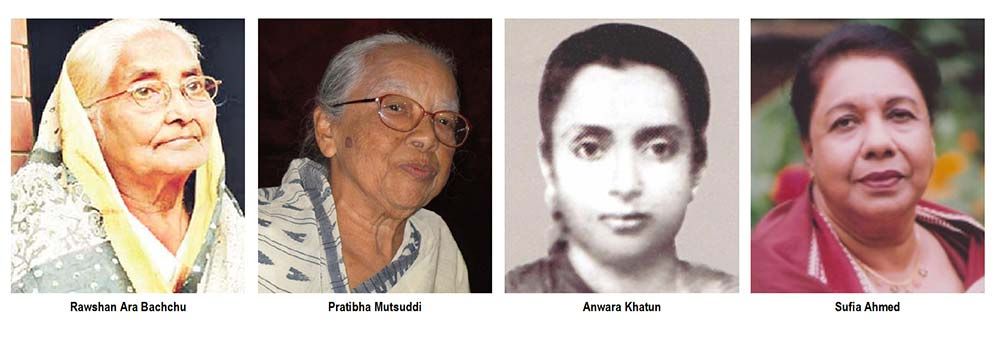 In August 1947, under the leadership of Professor Abul Kashem, ‘Tamuddin Majlis’ was formed to strengthen the demand for Bengali language. Abul Kashem’s wife Rahela, sister Rahima and Rahela’s brother’s wife Rokeya cooked and fed the protesters at their Azimpur residence for a long time. Not only that, the police surrounded the house of Abul Kashem on the 23rd of Bayannar at 4 pm. Inside, Abul Kashem and Abdul Ghafoor and others are busy publishing Sainik, the spokesperson of the language movement. Mrs. Rahela Kashem had a long argument with the police against the police trying to enter the family home at night when the police repeatedly knocked on the door.
In August 1947, under the leadership of Professor Abul Kashem, ‘Tamuddin Majlis’ was formed to strengthen the demand for Bengali language. Abul Kashem’s wife Rahela, sister Rahima and Rahela’s brother’s wife Rokeya cooked and fed the protesters at their Azimpur residence for a long time. Not only that, the police surrounded the house of Abul Kashem on the 23rd of Bayannar at 4 pm. Inside, Abul Kashem and Abdul Ghafoor and others are busy publishing Sainik, the spokesperson of the language movement. Mrs. Rahela Kashem had a long argument with the police against the police trying to enter the family home at night when the police repeatedly knocked on the door.
And on this occasion Abul Kashem and others managed to escape by climbing the back wall. Then the police went inside and left without seeing anyone. At the beginning of the language movement, this contribution of women in Andaramahal played an important role in advancing the movement’s later programs. Because if Abul Kashem and others were arrested that night, the propaganda might have stopped. The contribution of women is neglected.
On Thursday, January 31, 1948, at an all-party meeting at Dhaka’s Bar Library, Eden College student Mahbuba Khatun said, “If necessary, girls will sacrifice their blood to accept the demand of making Bengali the national language.At the beginning of the movement, such a bold statement from a girl’s mouth played a special role in motivating the workers. Later, Bangabandhu Sheikh Mujibur Rahman wrote in his autobiography about the events of 1948, “Hundreds of student activists started picketing Eden Building… and other places from the early hours of March 11.” … At 8 am in front of the post office, the students were violently lathi-charged. … Some students were also beaten up. … The East Pakistan Legislative Assembly was then in session. …Anwara Khatun and many others strongly protested (at the session) against the Muslim League Party.” When Jinnah’s proclamation was reiterated by Khwaja Nazimuddin on January 27, 2012, the students played a brave role in building the main field of the Great Ekush. Dhaka University and Eden College students collected money and wrote posters throughout the night to strengthen the movement. On February 21, the main task of breaking the police barricade was done by Roshan Ara Bachchu and some other students. Because many of the first two groups of 10 people were arrested. Students jumped over and over the barricade. Later, the students came out in the third group and started pulling the barricades. On that day many girl students were injured in police lathi charge and tear shells. Among them were Roshan Ara Bachchu, Sara Taifur, Borkha Shamsun, Sufia Ibrahim, Suraiya Dolly and Suraiya Hakim.
Also read: International Mother Languages Day: Using Technology for Multilingual Learning – Challenges and Opportunities
On that day, Anwara Khatun, a member of the East Bengal Legislative Council, said in a protest speech, “Mr. Speaker, the girls were injured in the lathi charge of the police.”… The total number of girls injured is 8. The cabinet has created such a climate that even girls are being assaulted. Outside Dhaka, women were subjected to police torture while joining the language movement. Everyone knows about Mumtaz Begum of Narayanganj. At one stage of the torture, her husband divorced her under the pressure of the government. Teens like Mumtaz Begum’s student Ila Bakshi, Benu Dhar and Shabani were also arrested by the police. Saleha Begum of Kulaura, Moulvibazar, Sylhet, when she was a class 10 student of Mymensingh Muslim Girls School, hoisted the black flag in memory of language martyrs. He was expelled from the school for three years on the orders of DC DK Pawar for this crime. Saleha Begum was no longer able to study.
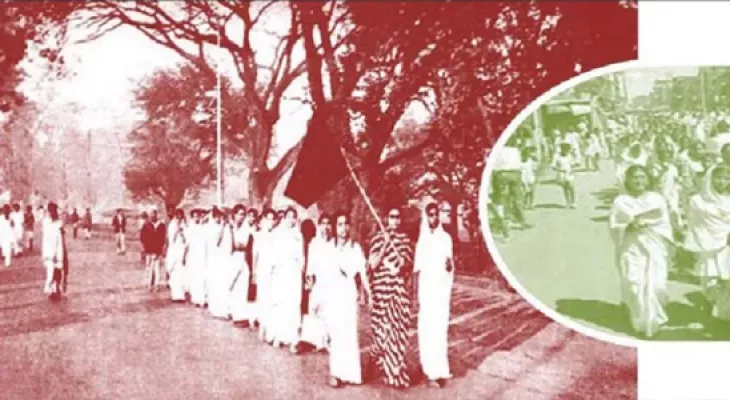 The biggest event in women’s participation in the language movement took place on 21 February 1952. On that day, 21 students of Dhaka University were arrested for violating Section 144. Among them are Laila Noor, Pratibha Mutsuddi, Roshan Ara Benu, Farida Bari, Jahrat Ara, Kamrun Nahar Laili, Hosne Ara, Farida Anwar and Talea Rahman. At that time, female university students had to speak to men with the proctor’s permission and in front of the proctor.
The biggest event in women’s participation in the language movement took place on 21 February 1952. On that day, 21 students of Dhaka University were arrested for violating Section 144. Among them are Laila Noor, Pratibha Mutsuddi, Roshan Ara Benu, Farida Bari, Jahrat Ara, Kamrun Nahar Laili, Hosne Ara, Farida Anwar and Talea Rahman. At that time, female university students had to speak to men with the proctor’s permission and in front of the proctor.
The women of the village were imprisoned behind the veil. At such a time, pushing the social, religious, institutional and state barriers, women came down on the streets to demand Bengali language – it was a big deal. Apart from the police barricade, the students did not have much of a barrier. There were many risks for women to participate in the movement. Women joined men in the movement to demand the uplift of the mother tongue, ignoring these serious problems. Women also played a leading role in the language struggle but for unknown reasons that role remains unacknowledged.
The names of women language activists are hardly mentioned. It is the demand of the time to present the history of language struggle to the new generation properly. It is our moral responsibility to present to the new generation the courageous women who have made outstanding contributions to the language movement in spite of all the odds.
__________________